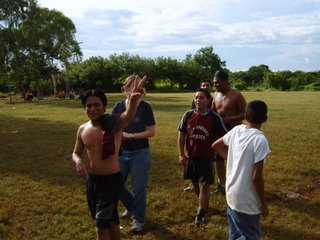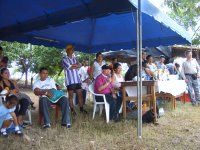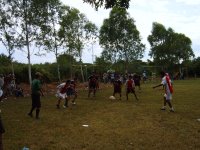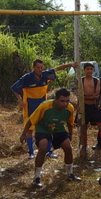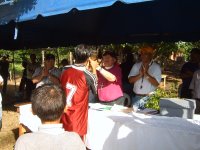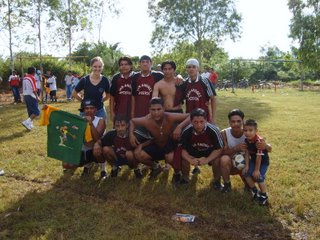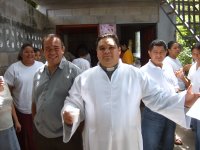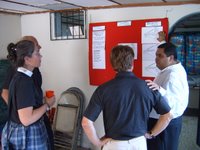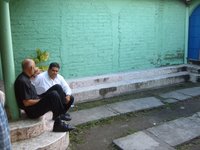Events Honoring "Anglican Women's Month"
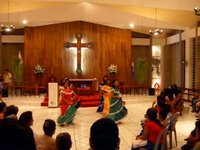
Folkloric Dancers from the diocesan youth group perform at the dinner held in honor of the Anglican women of El Salvador
October is celebrated as "The Month of the Anglican Woman" in the Province of Central America, and it was well celebrated this year in the Diocese of El Salvador! The Diocesan 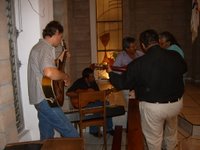 Commission on Women's Ministry hosted a vigil, at which Amy and four other women from the diocese gave talks on "spiritual healing" for ourselves, our families, our communities, and our
Commission on Women's Ministry hosted a vigil, at which Amy and four other women from the diocese gave talks on "spiritual healing" for ourselves, our families, our communities, and our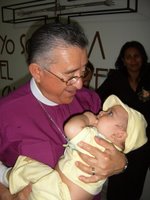 church. Each talk was over an hour long, a combined band from several of the local churches (a number of whom have studied guitar with Vince) enlivened the worshippers at intervals, and the vigil ended with the Holy Eucharist at 6AM!
church. Each talk was over an hour long, a combined band from several of the local churches (a number of whom have studied guitar with Vince) enlivened the worshippers at intervals, and the vigil ended with the Holy Eucharist at 6AM!
A week later over 200 women, men, youth, and children enjoyed a "Prayer Dinner" hosted by the Diocesan Women's Commission. Women representing all of the congregations in the diocese were present and gave messages, a group of young women from San Salvador area churches enlivened us with traditional folk dance, and a wonderful time was had by all. 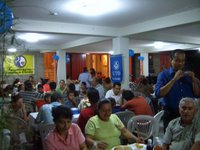
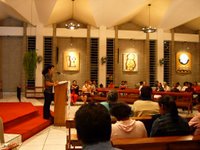 Lt.-People from around the diocese enjoy the annual dinner. Rt.- San Andres Apostol vestry member Vilma Ayala gives a sermon at the all night vigil
Lt.-People from around the diocese enjoy the annual dinner. Rt.- San Andres Apostol vestry member Vilma Ayala gives a sermon at the all night vigil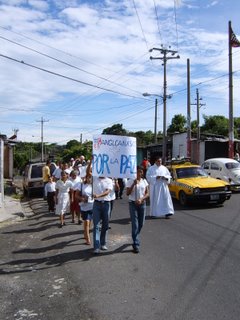 Not to be left out, the churches in the greater Soyapango area to the east of San Salvador (San Andrés in Amatapec, Santa María Vírgen in Ilopango, and Santísima Trinidad in San Martín) hosted a ¨Mini-Congress" on women's ministry, lay and ordained, in the church. The mini-congreso began with a two-mile march for peace from the main boulevard that connects our communities (ironically, Boulevard de los Ejercitos, "Army Boulevard") up to San Andrés.
Not to be left out, the churches in the greater Soyapango area to the east of San Salvador (San Andrés in Amatapec, Santa María Vírgen in Ilopango, and Santísima Trinidad in San Martín) hosted a ¨Mini-Congress" on women's ministry, lay and ordained, in the church. The mini-congreso began with a two-mile march for peace from the main boulevard that connects our communities (ironically, Boulevard de los Ejercitos, "Army Boulevard") up to San Andrés.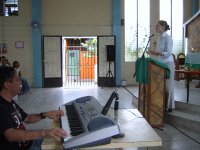 All three of our communities have been heavily hit by violence over the past few months, and young men associated with both San Andrés and Santa María Vírgen have been killed in the gang's cross-fire. The march, in which about 40 people all dressed in white partipated, drew a lot of attention in the community. Once we arrived at the church, we continued singing some very enlivening songs, as Vince said "we freakin' rocked the joint!", and heard an encouraging message from Padre Julio of Santa María Vírgen. Speaking on the raising of Lazarus he said, ¨Christ asked the people to roll away the stone. That was possible for them. They couldn´t raise the dead. But they could roll away the stone. Christ asks us to do what is possible for us, and to leave the impossible to him, because God is a specialist in the impossible!¨ Amy gave a talk which answered theological and biblical objections to women´s ordained ministry, empowering people to explain these things to others who don´t understand in this heavily
All three of our communities have been heavily hit by violence over the past few months, and young men associated with both San Andrés and Santa María Vírgen have been killed in the gang's cross-fire. The march, in which about 40 people all dressed in white partipated, drew a lot of attention in the community. Once we arrived at the church, we continued singing some very enlivening songs, as Vince said "we freakin' rocked the joint!", and heard an encouraging message from Padre Julio of Santa María Vírgen. Speaking on the raising of Lazarus he said, ¨Christ asked the people to roll away the stone. That was possible for them. They couldn´t raise the dead. But they could roll away the stone. Christ asks us to do what is possible for us, and to leave the impossible to him, because God is a specialist in the impossible!¨ Amy gave a talk which answered theological and biblical objections to women´s ordained ministry, empowering people to explain these things to others who don´t understand in this heavily 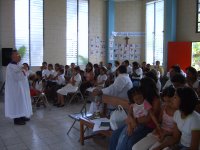 Roman Catholic context. Bishop Barahona arrived, vested in white (just a little too late for the march!) and spoke movingly about his experience with women´s ministry in the church. ¨We are very, very close to ordaining the first Salvadoran woman in El Salvador,¨ he said (the three women Bishop Barahona has ordained in El Salvador have all been North Americans). The mini-congreso closed with a Eucharist, at which Bishop Barahona presided, and just under 200 people were present. The people gathered signed a card of congratulations and support for Presiding Bishop Katharine Jefferts Schori. It was truly moving to share this event with our closest neighbor congregations, and we plan to have a lot more shared events in the future.
Roman Catholic context. Bishop Barahona arrived, vested in white (just a little too late for the march!) and spoke movingly about his experience with women´s ministry in the church. ¨We are very, very close to ordaining the first Salvadoran woman in El Salvador,¨ he said (the three women Bishop Barahona has ordained in El Salvador have all been North Americans). The mini-congreso closed with a Eucharist, at which Bishop Barahona presided, and just under 200 people were present. The people gathered signed a card of congratulations and support for Presiding Bishop Katharine Jefferts Schori. It was truly moving to share this event with our closest neighbor congregations, and we plan to have a lot more shared events in the future.
